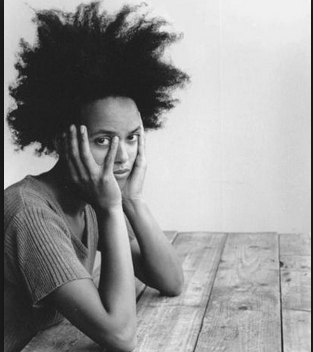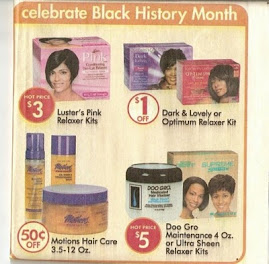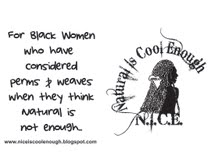Little girls generally do not know how to take care of/manage their own hair. It's normal. They are children after all. Initially, they don't know how to clean themselves, dress themselves, tie their shoes, brush their teeth, use the toilet or anything. So we teach them with the expectation that they will be able to handle all of their bodily needs at some point. Then there is that day when the little girl reaches an age when she says "mommy, I think I want to do my own hair." For some, this can be heartbreaking because it is a sign that she is branching out on her own just like that day when she stood up from her crawl and started to walk and you knew that things were going to be a little different. Well, imagine the little girl that never learned how to do any of those things mentioned above. Imagine if she was absolutely stifled in every way, so much so that she would openly admit that she can't manage one of her basic bodily needs. Now let's narrow that down to her hair. Imagine if she said, "I don't know how to comb/style my hair. I just don't know what to do with it. It grows out of my scalp. It's a part of me, but honestly, I don't know how to approach it. I am going to have to pay someone for the rest of my life to do it for me because I just can't." Oh really? Is this acceptable? Apparently yes, because it is a common statement made by many Black women as to why they can't wear their hair naturally, because they do not know how to take care of their hair, as it grows out of their scalp.
Now, I have been around some brilliant Black women including college students, Professors, Doctors, Nurses, Lawyers, graduate students and the list goes on. I have sat in rooms with many of these women, discussing hair, and I have seen some of them nearly break down as they sit permed/weaved and share that one of or THE reason that they choose not to wear their hair naturally is because they do not know what to do with their hair as it grows out of their scalp. They admit this openly, sometimes with shame, but most often not. Little do they know is that what I am thinking as they are saying this is really? But you are in college, or you are a Professor, Doctor, Nurse, hold a job, etc. (voice rising to crescendo level) and you don't know how to take care of your own hair? Girl really? Of course I never say this, but oh yes, it Is indeed, what I am thinking. I am also thinking, this is NOT OK! This is an unacceptable state of dependency for Black women. Surely, everyone can understand the need for some luxurious pampering in a hairdressers chair but the matter becomes different when you have to pay someone to do it because you can't/don't know how to do it yourself.
This open admission that one is incapable of taking care of/managing her own hair sends the following messages, as examples, particularly if there is a young girl modeling your behavior, or just anyone around you hearing you state that you are incapable of taking care of your hair as it grows out of your scalp:
1. I am incapable of taking care of my own hair as it grows out of my scalp so I missed a key independent skill;
2. I must always be dependent on others to handle what I cannot, especially my hair;
3. I must change who I am (from a hair vantage point, eg. perm/weave) because I can't manage my own hair as it grows from my scalp.
4. Although I am brilliant in other ways (hold a job, run my own business, college student/graduate, have a professional degree (lawyer, doctor, etc), I can't do my own hair.
5. I have to spend money on a regular basis to get my hair done, not because I want to necessarily but because I don't know how to do it myself, so I have to.
So here is a written tutorial with some video insight as to how to take care of your natural hair :
Wash your hair with frequency. No, you don't need to wash it every day but it must be washed often. If anyone tells you otherwise, just look in the mirror and tell yourself the truth. You know when your hair needs to be washed because the need to do so will be revealed to you by odor, itchiness, feel and general common sense. Any style that enables you to go without washing your hair for long periods of time is not conducive to cleanliness. So here is an interesting video entitled "How Often Should I Wash My Hair:"
Once your hair is washed, twist it or braid it and let it dry. Try to avoid the blow dryer. The constant heat on the hair can lead to breakage, drying and other problems. Letting your hair dry naturally, without a blow dryer will come in handy as I was in the locker room one day, after working out, and many of the women were doing their hair. I was twisting my locks and the power went out. The blow drying women lost it. I just stood smiling and twisting as they ran around in hysteria trying to figure out what they were going to do with their hair because there was no electricity. I didn't even need the mirror, that could not be seen in the darkness, as I twist by feel and can do the same with braids as I used to braid my hair, even in the back of my head, without a mirror.
Also, a bit of interesting information to explore is who invented the hair dryer and blow dryer? Interestingly the French (Europeans) (who also invented the straightening comb) invented the hair dryer. See details per the links below:
The Hair Dryer
http://www.nytimes.com/2013/07/21/magazine/who-made-that-hair-dryer.html?_r=0
The Blow Dryer
http://www.madehow.com/Volume-7/Hair-Dryer.html
So below is a simple hair washing video which does not require blow drying after. Note that her washing technique can also be accomplished in the shower, rather than the sink. Believe it or not, there are a number of videos on YouTube about how to wash your natural hair. Honestly, I don't understand why in the world a video is needed but this is one of many:
If you do not know how to twist or braid your hair after washing, or at any time, it is easy to learn how to do so. Here are a couple of videos to show you some simple techniques:
Now, I have been around some brilliant Black women including college students, Professors, Doctors, Nurses, Lawyers, graduate students and the list goes on. I have sat in rooms with many of these women, discussing hair, and I have seen some of them nearly break down as they sit permed/weaved and share that one of or THE reason that they choose not to wear their hair naturally is because they do not know what to do with their hair as it grows out of their scalp. They admit this openly, sometimes with shame, but most often not. Little do they know is that what I am thinking as they are saying this is really? But you are in college, or you are a Professor, Doctor, Nurse, hold a job, etc. (voice rising to crescendo level) and you don't know how to take care of your own hair? Girl really? Of course I never say this, but oh yes, it Is indeed, what I am thinking. I am also thinking, this is NOT OK! This is an unacceptable state of dependency for Black women. Surely, everyone can understand the need for some luxurious pampering in a hairdressers chair but the matter becomes different when you have to pay someone to do it because you can't/don't know how to do it yourself.
This open admission that one is incapable of taking care of/managing her own hair sends the following messages, as examples, particularly if there is a young girl modeling your behavior, or just anyone around you hearing you state that you are incapable of taking care of your hair as it grows out of your scalp:
1. I am incapable of taking care of my own hair as it grows out of my scalp so I missed a key independent skill;
2. I must always be dependent on others to handle what I cannot, especially my hair;
3. I must change who I am (from a hair vantage point, eg. perm/weave) because I can't manage my own hair as it grows from my scalp.
4. Although I am brilliant in other ways (hold a job, run my own business, college student/graduate, have a professional degree (lawyer, doctor, etc), I can't do my own hair.
5. I have to spend money on a regular basis to get my hair done, not because I want to necessarily but because I don't know how to do it myself, so I have to.
So here is a written tutorial with some video insight as to how to take care of your natural hair :
Wash your hair with frequency. No, you don't need to wash it every day but it must be washed often. If anyone tells you otherwise, just look in the mirror and tell yourself the truth. You know when your hair needs to be washed because the need to do so will be revealed to you by odor, itchiness, feel and general common sense. Any style that enables you to go without washing your hair for long periods of time is not conducive to cleanliness. So here is an interesting video entitled "How Often Should I Wash My Hair:"
Once your hair is washed, twist it or braid it and let it dry. Try to avoid the blow dryer. The constant heat on the hair can lead to breakage, drying and other problems. Letting your hair dry naturally, without a blow dryer will come in handy as I was in the locker room one day, after working out, and many of the women were doing their hair. I was twisting my locks and the power went out. The blow drying women lost it. I just stood smiling and twisting as they ran around in hysteria trying to figure out what they were going to do with their hair because there was no electricity. I didn't even need the mirror, that could not be seen in the darkness, as I twist by feel and can do the same with braids as I used to braid my hair, even in the back of my head, without a mirror.
Also, a bit of interesting information to explore is who invented the hair dryer and blow dryer? Interestingly the French (Europeans) (who also invented the straightening comb) invented the hair dryer. See details per the links below:
The Hair Dryer
http://www.nytimes.com/2013/07/21/magazine/who-made-that-hair-dryer.html?_r=0
"In 1888, Alexandre-Ferdinand Godefroy, a French coiffeur inventeur— that’s hairstylist inventor — patented the hair dryer’s earliest ancestor. The contraption was to be hooked up “to any suitable form of heater,” which would send hot air through a pipe to a dome surrounding the woman’s head. "
The Blow Dryer
http://www.madehow.com/Volume-7/Hair-Dryer.html
So below is a simple hair washing video which does not require blow drying after. Note that her washing technique can also be accomplished in the shower, rather than the sink. Believe it or not, there are a number of videos on YouTube about how to wash your natural hair. Honestly, I don't understand why in the world a video is needed but this is one of many:
If you do not know how to twist or braid your hair after washing, or at any time, it is easy to learn how to do so. Here are a couple of videos to show you some simple techniques:
How to Braid Cornrows
How to 2 Strand Twist
How to Braid
Hopefully, the next time the topic comes up regarding your ability to take care of your hair, you will be able to say, I am Black, brilliant and Beautiful AND I know how to take care of my own natural hair. That will be N.I.C.E.!
















